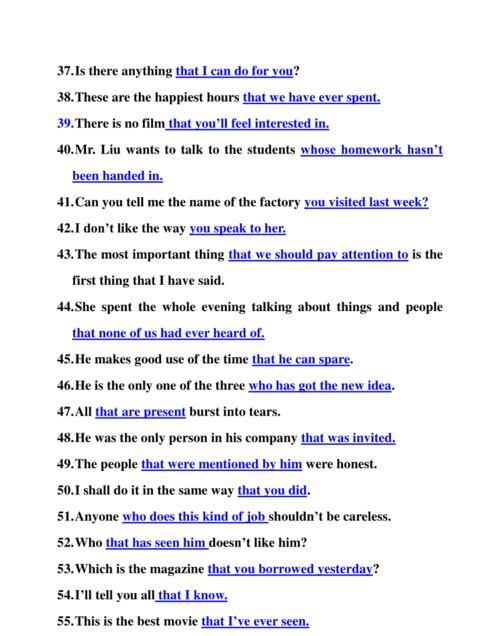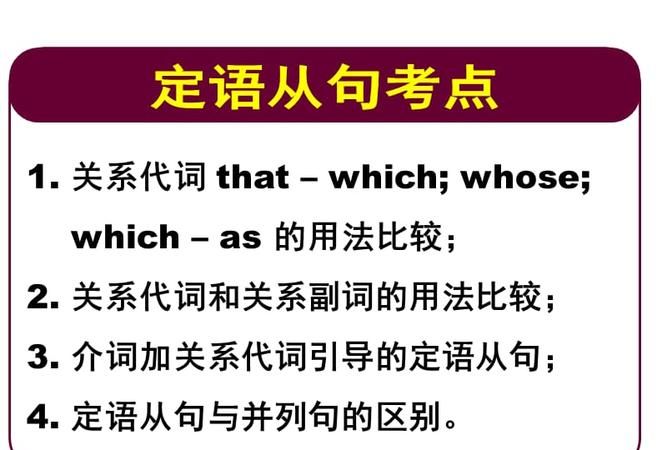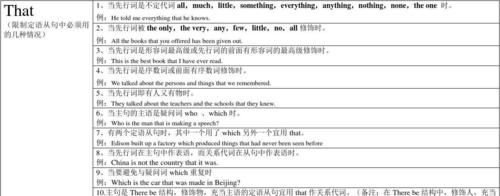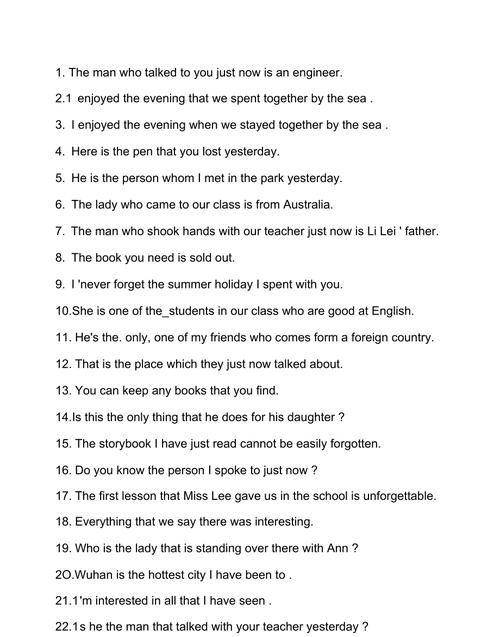本文目录
定语从句合成句子例子
定语从句是英语里的很重要的知识,以下是专门为你收集整理的定语从句合成句子抄写,供参考阅读!
定语从句 的'英文句子
1.this is the book which i like the most.
2.the box which is full of books should be empty as soon as possible.
3. i am the one who wrote to you.
4.the teacher who teaches us maths is a young man.
5.i want to find a place where is quiet and good.
6. the restaurant where we had our lunch last time is in tha 17th street.
7.the book that you borrowed from me yesterday is helen's ,not mine.
8.the dog that is eating over there belongs to the shopkeeper.
9.i like the movie that i watched yesterday.
10.do you think the picture that is taken by john is good?
定语从句的中英文优美句子
1. 我是一个16岁的女孩,在日坛中学上学。
I’m a 16-year-old girl, who is studying in Beijing RitanHigh School.
2. 我捡起了游客扔下的垃圾。
I picked up the garbage/rubbish/litter that/which the tourists/visitorsthrew away.
3. 她是我见过的最漂亮的女孩。
She is the most beautiful girl that I have ever seen/met.
4.这就是我曾经工作过的工厂。
This is the factory that/whichI worked in.
This is the factory where I worked.
5.这就是我上周参观过的那家工厂。
This is the factory that/which I visited last week.
6.这是我读过的最有趣的小说。
This is the most interesting novel that I have ever read.
7.他将于四月访问我们学校,到时,他将给我们做一个关于如何学英语的讲座。
He is going to visit our school in April, when he will give/deliver us a lecture about how tolearn English .
8.在我们学校,有一个大图书馆,在那儿我们能够读到我们感兴趣的书。
In our school, there is a big library, where we canread the books
that/which we are interested in.
9.我昨天去了上海,那是我出生的地方。
Yesterday I went to Shanghai, where I was born.
10.他这次考试又没及格,这让他的父母很生气。
He didn’tpass/failed theexam again, which made his parents very angry.

高中定语从句专项训练100题
A. on which’s top
B. onits top
C. on the top of it
D. on whose top
52.Bungee jumping is an adventurous sport, popular with young adults,____ courage matters more than strength.
A. whose
B. that
C. of which
D. where
53.The moment____ Leo will never forget is____ Mr. Green gave him a lot of valuable advice on how to improve his writing.
A. that ; when
B. that; that
C. when ; that
D. when; where
54.Mount Wudang is such an attractive place of interest_____ everyone wants to visit.
A. that
B. as
C. which
D. where
55.I feel uncomfortable each time I remember the situation____ Mary didn’t agree with me ____the matter.
A. that ; at
B. in which ; over
C. which; about
D. where ; to
56.Good ad often uses words________ people attach positive meanings.
A. in which
B. to which
C. which
D. that
57.The foxes hid themselves in the places________ couldn’t be found.
A. that
B. where
C. inwhich
D. in that
58.I’ll show you a shop___ you may buy all___ you need.
A. in which,/
B. where, which
C. which, that
D. that ,that
59.Is it true________ he has suggested is appreciated by his manager?
A. that what
B. that whether
C. that if
D. what that
60.Is that the reason______ you agree to the plan?
A. for which
B. what
C. in which
D. for that
61.He was seen to sit at a _________table yesterday.
A. three-legs
B. threelegs
C. three-legged
D. three legged
62.He wrote a_________ composition.
A. two-thousand-words
B. two-thousand-word
C. two-thousands-word
D. two-thousands-words
63.Two________teachers and four_________ students were praised at the meeting yesterday.
A. women, girl
B. woman,girl
C. woman, girls
D. women,girls
64.I have many friends,________ some are businessmen.
A. of who
B. from which
C. who of
D. of whom
65.Jim passed the driving test,_______ surprised everybody in the office.
A. which
B. that
C. this
D. it
66.This is the only dictionary_________ I often turn to for help.
A.which
B. that
C. what
D. one
67.They talked things and persons________ they remember at the school.
A. that
B. who
C. which
D. whom
68.The flowers________ sweet in the part attract the passers-by to the beauty of nature.
A. to smell
B. smelling
C. smelt
D. to be smelt
69.Most of the artists _________to the party were from South Africa.
A. invited
B. to invite
C. being invited
D. had been invited
70.David gets up early and takes exercise in the morning,________ is usual with him.
A. as
B. that
C. what
D. so
71.______to take this adventure course will certain learn a lot of useful skills.
A. Brave enough students
B. Enoughbrave students
C. Students brave enough
D. Students enough brave
72.He has two sons,_________ are college students.
A. both of which
B. both of whom
C. both of them
D. both of it
73.He has two sons, and_________ are college students.
A. both of which
B. both of whom
C. both of them
D. both of it
74.He still lives in the room________ window faces to the east.
A. which
B. whose
C. where
D. of which
75.He still lives in the room, the window________faces to the east.
A. which
B. whose
C. where
D. of which
76.He still lives in the room_________ is in the north of the city.
A. which
B. whose
C. where
D. of which
77.He still lives in the room________ there is a beautiful table.
A. which
B. whose
C. where
D. of which
78.________we all know, China is rich in natural resources.
A. Which
B. As
C. It
D.That
79.________is well-known that China is rich in natural resources.
A. Which
B. As
C. It
D. That
80.________is well-known, China is rich in natural resources.
A. Which
B. As
C. It
D. That
81.I’ll never forget the days___ we studied together.
A. that
B.不填
C. when
D. A and B
82.I’ll never forget the days___ we spent together.
A. that
B.不填
C. when
D. A and B
83.Is this museum________ they visited last month?
A. that
B. the one
C. which
D. the one who
84.The teacher tells us that___ clean the blackboard is to be praised.
A. that
B. the one
C. which
D. the one who
85.It was eleven o’clock___ they went out of the cinema.
A. which
B. that
C. when
D. on which
86.It was at eleven o’clock___ they went out of the cinema.
A. which
B. that
C. when
D. on which
87.Oct.1.1949 was the day___ the new China was founded.
A. that
B. in which
C. when
D. where
88.This is the largest clock in the world,___the minute hand is six meters long.
A. where
B. of which
C. that
D. whose
89.The best means__ we used in our English study___ fast reading.
A. that, is
B, which, is
C.which ,are
D. that, are
90.I found the glass just___ I borrowed the other day so I got it back at once.
A. the same which
B. the same as
C. the same that
D. such that
91.Is she the girl_______ drawing is the best in your class?
A. whom
B. whose
C. aswhom
D. of who
92.In nature some animals actively defend the area____ they depend for the resources.
A. in which
B.on which
C. which
D. where
93.He visited the Eiffel Tower, which___ to1889, during his stay in France last summer.
A. dated back
B. dates back
C. has dated back
D. has been dated back
94.Japan Pom Pom, a seniors’ cheer leading group,_____ members’ ages average 66, practices two hours a week and often performs at nursing homes.
A. where
B. which
C. whose
D. whom
95.Car racing is an adventurous sport,popular with young men, _____ quick mind and skill matters much more than anything else.
A. where
B. what
C. when
D. that
96.They wouldn’t agree to sell the house tous at the same price_____ they had promised,___ was rather disappointing.
A. which, as
B. as,that
C. that , that
D .as , which
97.That is the writer______ a lot of books were written.
A. by whom
B. who
C. whose
D. whom
98.David was responsible and hardworking,_____ he was promoted from a clerk to a manager.
A. which
B. as
C. forwhat
D. for which
99.All the neighbors admire the family, _____the children and parents build up a friendly relationship.
A. which
B. why
C. where
D. that
100.Our chief engineer is a man of many gifts,_____ absence we find many problems difficult to solve.
A. during whose
B. whose
C. in which
D. whom

when定语从句例句20句
例句:
1、 I don’t know the reason why he came so late. 我不知道他来得那么晚的原因。
2、That is the reason why I don’t want to go. 那就是我不想去的理由。
3、He didn’t tell me the reason why he was so upset.他没有告诉我他为什么那样心烦意乱。
4、This is the office where he worked. 这就是他工作过的办公室。
5、She is going to live in Macao, where she has some close friends. 她要到澳门去定居, 在那里她有几个密友。
定语从句:
定语从句,一个简单句跟在一名词或代词后(先行词)进行修饰限定,就叫做 定语从句。在主句中充当定语成分。
被修饰的词叫 先行词。定语从句不同于单词作 定语的情况,它通常只能放在被修饰的词(即 先行词)之后。定语 从句由 关系词( 关系代词、 关系副词)引导, 关系代词、 关系副词位于定语从句句首。
关系代词引导的定语从句
关系代词所代替的 先行词是人或物的 名词或 代词,并在句中充当 主语、 宾语、 定语等成分。 关系代词在定语 从句中作 主语时,从句 谓语动词的人称和数要和 先行词保持一致。

高中定语从句经典例题
Part1:
[例1] Friendship is needed by all, _____ plays an important role in people’s lives.
A. which B. that C. who D. it
分析:_____ plays an important role in people’s lives为非限定性定语从句修饰先行词Friendship用which连接定语从句。
答案:A
[例2] Uncle Li _____ I worked three years ago has retired now.
A. who B. whom C. with whom D. to whom
分析:_____ I worked three years ago作为定语从句修饰先行词Uncle Li,从句完整的表达是:I worked with Uncle Li three years ago. 所以关系词前应加上介词with。
答案:C
[例3] Is this the reason _____ at the meeting for his carelessness in his work ?
A. he explained B. what he explained C. how he explained D. why he explained
分析:定语从句_____ at the meeting for his carelessness in his work修饰先行词the reason指“他在会上就他工作中的粗心解释的原因。先行词在从句中做宾语。
答案:A
[例4] Teachers, _____ work is rather hard, are being better paid than before.
A. who B. that C. which D. whose
分析:非限定性定语从句_____ work is rather hard修饰先行词teachers, 它与从句中的work是从属关系,关系词用whose
答案:D
[例5 ] The Olympic Games , _____ in 776 BC, didn’t included women players until 1912.
A. first playing B. to be first played
C. first played D. to be first playing
分析:公元前776年被首次举行的奥运会,直到1912年才容纳女运动员。_____in 776 BC做定语修饰The Olympic Games,指过去的内容,表示被动。用done做定语。
答案:C
[例6] The houses _____ for the teachers and the construction work will start soon.
A. built B. to be built C. to build D. being built
分析:根据句意房子即将开工。_____ for the teachers and the construction work修饰The houses应为The houses The houses将要为教师和施工修建的房子。
答案:B
[例7] How many of us_____, a meeting that is not important to us would be interested in the discussion?
A. attended B. attending C. to attend D. have attended
分析:根据句意:比如说,我们当中参加一个对我们毫不重要的会议的人会有多少人对这个讨论感兴趣呢?_____, say, a meeting that is not important to us修饰How many of us做定语。与全句动作同步.
答案:B
[例8] She has three children, _____ is working in Australia.
A. who B. one of whom C. one of them D. none of them
分析:非限定性定语从句__ is working in Australia修饰先行词three children,根据从句中的is判断,是说:三个孩子中的一个在澳大利亚工作。
答案:B
1. Susan is the very girl _____ the good deed.
A. whom I think did B. whom I think she did
C. who I think did D. I think who did
2. Luckily, the poor boy had enough money _____ he could buy a train ticket.
A. by which B. on which C. with which D. for which
3. The book _____ he devoted much time is to come out next month.
A. where B. which C. to which D. on which
4. The day came finally _____ I was given an opportunity to act in the play.
A. when B. in that C. which D. in which
5. 1. Don’t you think the question _____ tomorrow is of great importance.
A. being discussed B. discussed
C. to be discussed D. to discuss
6. The food _____ at the moment is for the dinner party.
A. cooked B. to be cooked C. is being cooked D. being cooked
7. Do you know the teacher _____ under the big tree ?
A. read B. reads C. reading D. being read
[参考答案]
1. C Susan 正是我认为作了好事的那位女孩。先行词the very girl在从句中做think的宾语,同时又是后面宾语从句did the good deed.的主语,所以关系词不能用whom
2. C 定语从句_____ he could buy a train ticket.修饰先行词money:用这笔钱买火车票。关系词前面需要加介词:with
3. C 定语从句_____ he devoted much time意思是:他把大量的时间都投入在这本书上了。devote….to sth.关系词前加介词:to
4. A 定语从句_____ I was given an opportunity to act in the play修饰先行词the day :先行词the day在从句中做时间状语:在这一天我得到了扮演一个角色的机会。
5. C 短语_____ tomorrow做定语修饰the question,根据表达的内容:明天即将被讨论的问题。应当用不定式的被动结构做定语。
6. D 短语_____ at the moment做the food的定语,表示:正在做的食物。Being done 做定语表示:正在被……的……。
7. C 现在分词短语reading under the big tree做定语修饰the teacher 表示:正在大树下看书的那位老师。
Part2:
共100分,每小题2分
(充分考虑先行词在从句中的句法作用)
1. A football fan(球迷) is _____ has a strong interest in football.
A. a thing that B. something that C. a person who D. what
2. The house, _____ was destroyed in the terrible fire, has been repaired.
A. the roof of which B. which roof C. its roof D. the roof
3. Can you lend me the novel _____ the other day?
A. that you talked B. you talked about it C. which you talked with D. you talked about
4. The matter _____ you were arguing about last night has been settled.
A. that B. what C. why D. for which
5. They talked for about an hour of things and persons _____ they remembered in the school.
A. which B. that C. who D. whom
6. Who _____ has common sense(常识) will do such a thing?
A. which B. who C. whom D. that
7. All the apples _____ fell down were eaten by the pigs.
A. that B. those C. which D. what
8. They asked him to tell them everything _____ he saw at the front.
A. what B. that C. which D. where
9. I’ll tell you _____ he told me last night.
A. all which B. all what C. that all D. all
10. A child _____ parents are dead is called an orphan.
A. who B. who’s C. whose D. which
11. Is this the museum _____ you visited the other day?
A. that B. where C. in which D. the one
12. Is this museum _____ some German friends visited last Wednesday?
A. that B. where C. in which D. the one
13. -How do you like the book?
-It’s quite different from _____ I read last month.
A. that B. which C. the one D. the one what
14. Which sentence is wrong?
A. The finger I dipped into the cup was not the one I put it into my mouth.
B. Do you know the boy who jumped onto the platform?
C. Science and new technology have made it possible for farmers to produce more food on the same amount of land.
D. People in ancient times took it for granted that the sun moved round the earth.
15. The train _____ she was traveling was late.
A. which B. where C. on which D. in that
16. He has lost the key to the drawer _____ the papers are kept.
A. where B. on which C. under which D. which
17. Antarctic _____ we know very little is covered with thick ice all the year round.
A. which B. where C. that D. about which
18. It’s the third time _____ late this month.
A. that you arrived B. when you arrived C. that you’ve arrived D.when you’ve arrived
19. He often helps the students _____ he thinks are not quick at their studies.
A. whom B. who C. when D. because
20. The Second World War _____ millions of people were killed ended in 1945.
A. when B. during that C. in which D. which
21. He was born in the year _____ the Anti-Japanese War broke out.
A. which B. when C. on which D. during which
22. Mr. Crossett will never forget the day _____ he spent with his various students.
A. when B. which C. during which D. on which
23. This is just the place _____ I am longing to visit these years.
A. that B. where C. in which D. to where
24. We are going to spend the Spring festival in Guangzhou, _____ live my grandparents and some relatives.
A. which B. that
C. who D. where
1-5 CADAB 6-10 DABDC 11-15 ADCAC 16-20 ADCBC
21-25 BBADA
Part3:
1.The place _______interested me most was the Children's Palace.
A. Which B. where C. what D. in which
2.Do you know the man _______
A. whom I spoke B. to who spoke C. I spoke to D. that I spoke
3.This is the hotel _______last month.
A. which they stayed B. at that they stayed
C. where they stayed at D. where they stayed
4.Do you know the year ______the Chinese Communist Party was founded
A. which B. that C. when D. on which
5.That is the day ______I'll never forget.
A. which B. on which C. in which D. when
6.The factory ______we'll visit next week is not far from here.
A. where B. to which C. which D. in which
7.Great changes have taken place since then in the factory _______we are working.
A. where B. that C. which D. there
8.This is one of the best films _______.
A. that have been shown this year B. that have shown
C. that has been shown this year D. that you talked
9.Can you lend me the book ______the other day
A. about which you talked B. which you talked
C. about that you talked D. that you talked
10.The pen ______he is writing is mine.
A. with which B. in which C. on which D. by which
11.They arrived at a farmhouse, in front of ______sat a small boy.
A. whom B. who C. which D. that
12.The engineer ______my father works is about 50 years old.
A. to whom B. on whom C. with which D. with whom
13.It there anyone in your class ______family is in the country
A. who B. who's C. which D. whose
14.I'm interested in ______you have said.
A. all that B. all what C. that D. which
15.I want to use the same dictionary ______was used yesterday.
A. which B. who C. what D. as
16.He isn't such a man ______he used to be.
A. who B. whom C. that D. as
17.He is good at English, ______we all know.
A. that B. as C. whom D. what
18.Li Ming, ______to the concert enjoyed it very much.
A. I went with B. with whom I went C. with who I went D.I went with him
19.I don't like ______ as you read.
A. the novels B. the such novels C. such novels D. same novels
20.He talked a lot about things and persons ________they remembered in the school.
A. which B. that C. whom D. what
21.The letter is from my sister, ______is working in Beijing.
A. which B. that C. whom D. who
22.In our factory there are 2,000 workers, two thirds of ____are women.
A. them B. which C. whom D. who
23.You're the only person ______I've ever met ______could do it.
A. who;/ B./; whom C. whom;/ D./; who
24.I lost a book, ______I can't remember now.
A. whose title B. its title C. the title of it D. the title of that
25.Last summer we visited the West Lake, ______Hangzhou is famous in the world.
A. for which B. for that C. in which D. what
26.I have bought such a watch _______ was advertised on TV.
A. that B. which C. as D. it
27.I can never forget the day _______ we worked together and the day ______ we spent together.
A. when; which B. which; when C. what; that D. on which; when
28.The way ______he looks at problems is wrong.
A. which B. whose C. what D./
29.This is the reason ______he didn't come to the meeting.
A. in which B. with which C. that D. for which
30.This machine, ______for many years, is still working perfectly.
A. after which I have looked B. which I have looked after
C. that I have looked after D. I have looked after
31.The reason ______he didn't come was ______he was ill.
A. why; that B.that;why C. for that;that D.for which;what
32.He is working hard, ______will make him pass the final exam.
A.that B.which C.for which D.who
33.That is not the way ______I do it.
A./ B.which C.for which D.with which
34.I have two grammars, ______are of great use.
A. all of which B. either of which C. both of that D. both of which
35.I want to use the same tools _______used in your factory a few days ago.
A. as was B. which was C. as were D. which
36.My neigh bours used to give me a hand in time of trouble, _______ was very kind of them.
A. who B. which C. that D. it
37.This is the magazine _______ I copied the paragraph.
A. that B. which C. from that D. from which
38.He is not such a man _______ would leave his work half done.
A. that B. which C. who D. as
39. You can depend on whatever promise _______ he makes.
A. / B. why C. when D. whose
40. Smoking, _______ is a bad habit, is, however, popular.
A. that B. which C. it D. though
41. --- Did you ask the guard _______ happened
--- Yes, he told me all _______ he knew.
A. what; that B. what; what C. which; which D. that; that
42. I shall never forget those years _______ I lived on the farm with
the farmers, _______ has a great effect on my life.
A. when; who B. that; which C. which; that D. when; which
43. The number of the people who _______ cars _______ increasing.
A. owns; are B. owns; is C. own; is D. own; are
44. During the days ________, he worked as a servant at the Browns.
A. followed B. following C. to follow D. that followed
45. Is oxygen the only gas _______ helps fire burn
A. that B. / C. which D. it
46. The clever boy made a hole in the wall, _______ he could see _____ was going on inside house.
A. which; what B. through which; what C. through that; what D. what; that
47. Is _______ some German friends visited last week
A. this school B. this the school C. this school one D. this school where
48. John got beaten in the game, _______ had been expected.
A. as B. that C. what D. who
49. I have bought two ballpens, _______ writes well.
A. none of them B. neither of them C. neither of which D. none of which
50. All that can be eaten _______ eaten up.
A. are being B. has been C. had been D. have been
定语从句练习题及详解50题
参考答案及解析
1. A. which用作关系代词,在定语从句中作主语.
2.C. "和谁讲话"要说speak to sb. 本题全句应为Do you know the man whom I spoke to..whom是关系代词,作介词to的宾语,可以省略.
3. D. where是关系副词,表示地点,在定语从句中作地点状语.
4. C. when是关系副词,表示时间,在定语从句中作时间状语.
5.A. which是关系代词,在从句中作forget的宾语.其他几个答案都不能作宾语.
6.C. 解析同第5题.
7. A. 解析见第3题.
8. A. 本句话的先行词应该是films,因此,关系代词that是负数概念,其谓语动词应用复述的被动语态have been shown.如果句中的one前面使用了定冠词the,则the one应该视为先行词.
9. A. "谈到某事物"应说talk about sth..about是介词,其后要用which作宾语,不能用that.
10. A. with which是"介词+关系代词"结构,常用来引导定语从句.with有"用"的意思,介词之后只能用which,不能用that. with which在定语从句中作状语,即he is writing with a pen.
11. C. in front of which 即in front of a farmhouse. In front of which在从句中作状语.
12. D. with whom引导定语从句.with whom放在从句中即为:my father works with the engineer.
13. D. whose引导定语从句,在从句中作主语family的定语.
14. A. that引导定语从句,因为先行词是all,所以只能选用that引导.
15. D. the same……..as是固定用法, as引导定语从句时,可以作主语,宾语或表语.在本句话中,as作从句的主语.
16. D. such……… as是固定用法,as引导定语从句时,可以作主语,宾语或表语.在本题中,as作表语.
17. B. as作关系代词可以单独用来引导非限制性定语从句.这时as所指代的不是主句中某个名词,而往往指代整个主句的含义.as在从句中可以作主语,宾语.从句可放在主句后,也可置于主句前.在本句中,as作宾语.
18. B. Li Ming enjoyed it very much是主句,with whom I went to the concert是定语从句.with whom放在从句中为:I went to the concert with Li Ming.
19. C. as引导定语从句时通常构成such…as或the same…as固定搭配,其中such和same修饰其后的名词,as为关系代词,指代其前的名词引导定语从句. as在从句中可以作主语,表语或宾语.Such修饰单数名词时,要用such a……..,本题中such books, such直接修饰复数名词.
20. B. things和persons是先行词.当定语从句要修饰的先行词是既表示人,又表示物的名词时,其关系代词要用that.
21. D. who引导非限制性定语从句,who作从句的主语.
22. C. two thirds of whom 即:two thirds of the 2,000 workers.
23. D. 先行词person后有两个定语从句,第一个从句省略了关系代词whom.因为, whom作从句中met的宾语,可以省略.第二个从句who could do it.who在从句中作主语,不可省略.
24. A. whose title引导非限制性定语从句,whose title也可以说成the title of which
25. A. for which 引导定语从句,使用介词for,是来自于从句中的固定短语 be famous for "以……..而闻名".
26. C. 当先行词被such修饰时,引导定语从句的关系代词要用as. As在本从句中作主语.
27. A. 两个先行词the day都是表示时间的名词,但第一个空白处要填的关系词在从句中作状语,因此要用关系副词when. 第二个空白处要填的关系词在从句中作动词spent的宾语,因此要用关系代词which或that来引导定语从句.
28. D. 在way,distance,direction等词后的定语从句中,常用that来代替"in (或其他介词)+which",when或where,而that常可省略.
29. D. for which在定语从句中作原因状语,可用why 来替代.
30. B. which I have looked after 构成一个非限制性定语从句.
31. A. The reason why… was that….已成为一种固定句型,这一句中的why和that不能随意换位,也不能将that改成because,尽管that这个词在译文中可能有 "因为"的含义.
32. B. 非限制性定语从句常用which引导,which表示前句话的整个含义.
33. A. 解释见28题.
34. D. 主句中的two表明不能选A.从句中的are表明不能选B. both of which用来引导非限制性定语从句.
35. C. as引导定语从句时通常构成such…as或the same…as固定搭配,其中such和same修饰其后的名词,as为关系代词,指代其前的名词引导定语从句.as在从句中可以作主语,表语或宾语.本题中as作从句的主语.
36. B. 非限制性定语从句常用which引导,which表示前句话的整个含义.
37. D.
38. D. 解析见35题.
39. A. he makes是定语从句, 从句前省略了关系代词that.
40. B. which is a bad habit 非限制性定语从句.
41. A. what happened是宾语从句. all 之后that he knew是定语从句.先行词是all,所以关系代词只能用that.
42. D. years是表示时间的名词,用when引导定语从句,是因为when在从句中作时间状语.第二个空选用which,引导一个非限制性定语从句.
43. C. 本句话的定语从句是who own cars. 其先行词是people,因此,定语从句的谓语动词要用复数的own.本句话主句的主语是The number of指"…..的数目",是单数概念.因此,主句的谓语动词要用is.
44. D. that followed是定语从句,关系代词that在从句中作主语.
45. A. 先行词gas被only修饰,关系代词要用that,而不用which.
46. B. through which引导定语从句,through which即through the hole,在定语从句中作状语.What引导的是see的宾语从句,并作从句的主语.
47. B. 为便于理解,改写本句话:This is the school that some Germanfriends visited last week. 不难看出,作表语的the school是先行词.that引导了定语从句,因为that同时又作visited的宾语,所以被省略了.其它选项结构不对.
48. A. 解释见35题.
49. C. 因为是two ballpens, 并且定语从句的谓语writes是单数概念.因此,C是正确选项.
50. B. 本句话中,主句的主语是all,为抽象概念.因此,其谓语应用单数的has been.关系代词that引导定语从句,并在从句中作主语.

以上就是关于高中定语从句例句00句,定语从句合成句子例子的全部内容,以及高中定语从句例句100句 的相关内容,希望能够帮到您。
